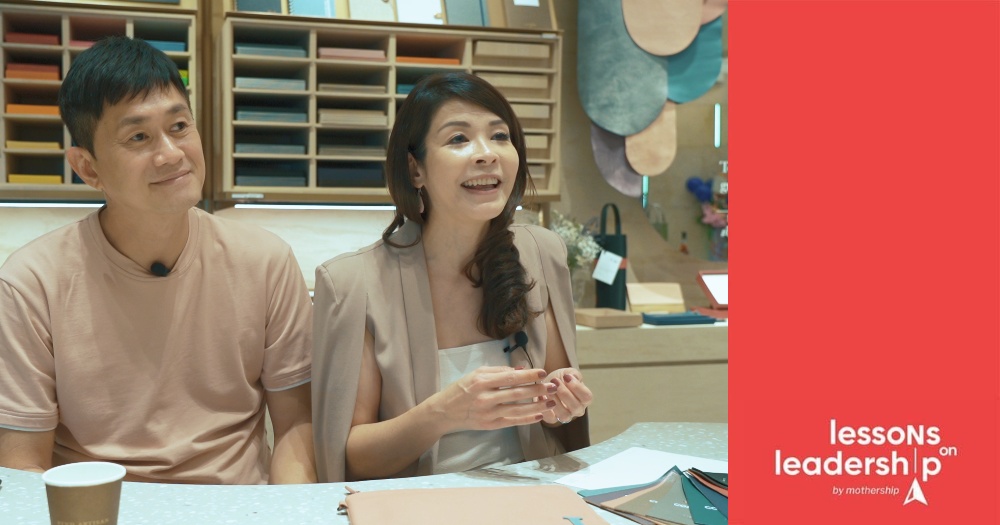Follow us on Telegram for the latest updates: https://t.me/mothershipsg
You might have heard the age-old adage about how you shouldn't date in the workplace, given all the potential problems you may face.
But what happens if your spouse is also your business partner?
This was a question I posed to Winnie Chan and James Quan, the wife-and-husband duo behind local brand Bynd Artisan, a company known for its customised leather products and personalised notebooks.
The pair's approach to avoiding workplace conflict is simple: Have a clear delineation of roles, and respect each other's area of responsibility.
Chan, who is the CEO, handles product development, human resources, corporate strategy and finance, among other things, while Quan focuses on sales and marketing as the chairman of the company.
And when arguments occur (inevitably), neither party will try to force his or her way. Instead, they will resort to a tie-breaker, by consulting their staff.
"I think our leadership style is quite consultative. We will chat with them, get their opinions. Because otherwise, I mean, I can decide on this, but if they don't buy it, it's very hard to execute," said Chan.
As I would learn later on, the duo spends a lot of time seeking opinions and incorporating feedback from various different parties, ranging from their regular customers, to family members, and naturally, their own staff, in order to build their business.
Bynd Artisan was born from a need for survival
I met Chan and Quan on a weekday morning, a week after the opening of Bynd Artisan's new ION Orchard branch.
It is a relatively large space, one that Bynd Artisan shares with Sunday Folks, an artisanal dessert parlour.
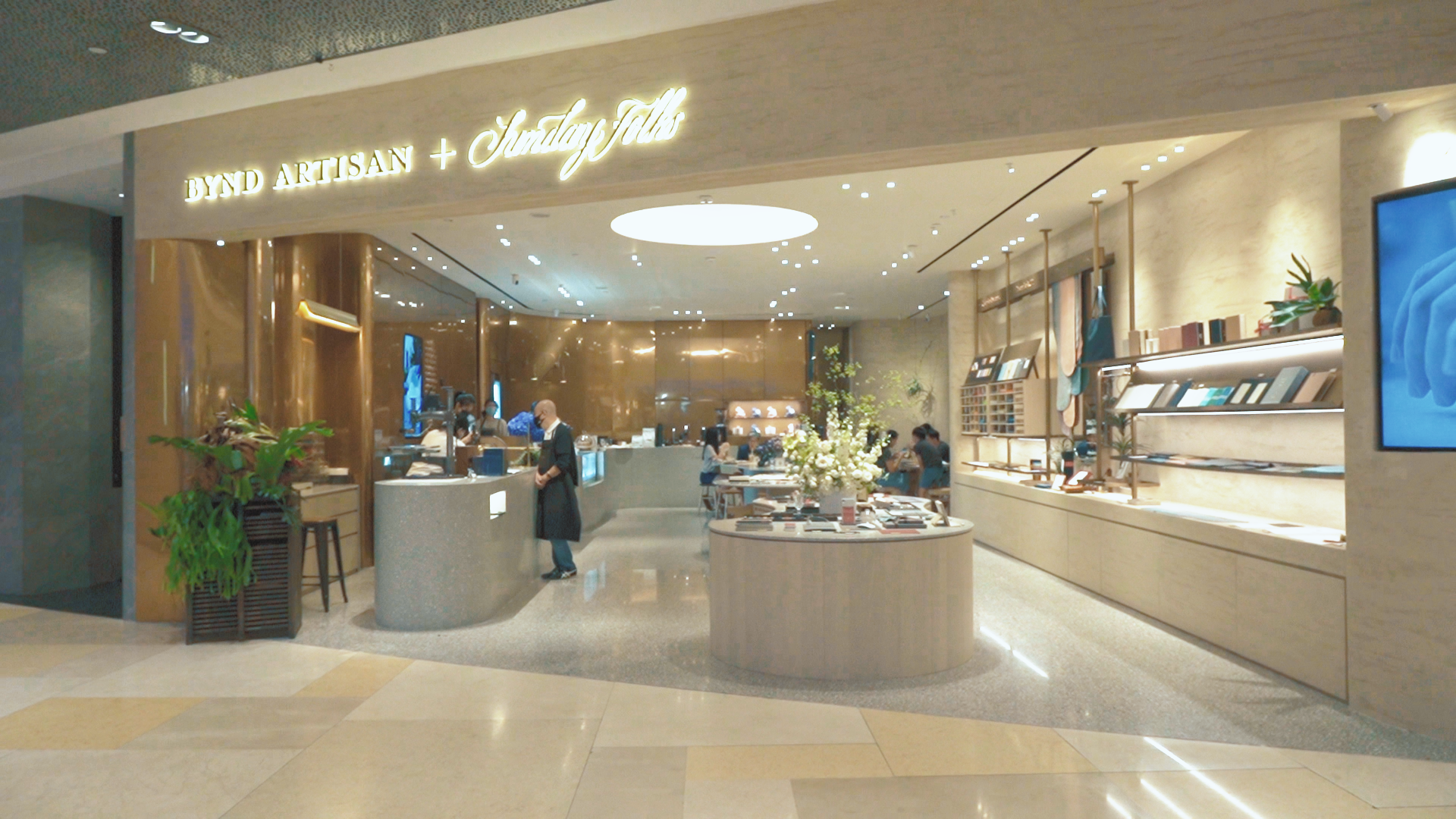 Image via As'ad Nazif.
Image via As'ad Nazif.
After a quick tour of the premises, we proceeded with the interview right in the middle of the shop, at a table that would otherwise be used to conduct crafting and calligraphy workshops.
I quickly delved into the main question that had been occupying my mind: In an increasingly digital world, why did the pair decide to start a business personalising notebooks?
As it turns out, there's a certain legacy aspect to Bynd Artisan's business model.
Chan's grandfather started a small bindery workshop in 1942, and over the years, the family business thrived on producing notebooks and other paper products.
Chan herself spent 22 years working in her family's business, and her decision to work on Bynd Artisan in 2012 was described as a "need for survival'.
Paper products were becoming more irrelevant day by day, and her family's business faced many problems, including the surge of online competitors, and paper designs that were simply "too old school".
Chan learnt the latter the hard way, when she brought home some paper designs one day, and her children asked her why she didn't consider "selling the business".
It was a sobering moment for Chan, but instead of giving up entirely, she decided to make full use of what she knew, by setting up Bynd Artisan.
"You know when you're in your 40s, you better not change jobs, or do something new," said Chan, paraphrasing a popular quote by Chinese entrepreneur Jack Ma.
Always be ready to embrace change
Having worked in the industry for more than two decades at the time, Chan was acutely aware that people were beginning to shun pen and paper, in favour of digital devices.
However, the pair also thought that the demand for paper products wouldn't simply fade overnight, given that many still prefer the "magic" that comes with writing on paper.
They explained that there is a deep history behind writing, and felt confident that the notebook was not yet at the end of its runway, with individuals still craving the familiar feeling of their pen flying across the page.
The presence of their repeat customers appear to indicate that this is indeed the case, as I saw more and more people enter the shop, some of which were visibly striking a friendly conversation with the artisans on duty.
In fact, Quan cheekily pointed out that I was using a notebook to take notes during the interview, proving that paper is not completely dead, even among younger people.
To further illustrate his point, he brought up the example of the personal digital assistant (PDA), a handheld mobile device that was touted as " the end of the notebook" in the 1990s.
The PDA has all but disappeared from modern life but people are still using notebooks. The notebook possesses a certain resilience, particularly those that are used for special purposes, said Quan.
He also said that the customisable notebook was one of the most important products for the brand when it first started, and it remains an important pillar of the company, due to its ability to adapt to the customers' needs.
"Rather than to just present paper as it was, we wanted to beautify it and allow people to personalise it and customise it," he explained.
And although paper products formed the core of Bynd Artisan's business at the beginning, the pair also made sure to future-proof the company, making sure that they take into account the evolving tastes of their customers.
Chan shared how her children grew up preferring to use photographs to take notes, rather than simply penning things down, and said that it was "really scary" for them, given that they are the next generation of customers.
In order to secure the company's future, Bynd Artisan made sure to diversify its offerings. One example would be its wide array of leather products, from luggage tags to card holders.
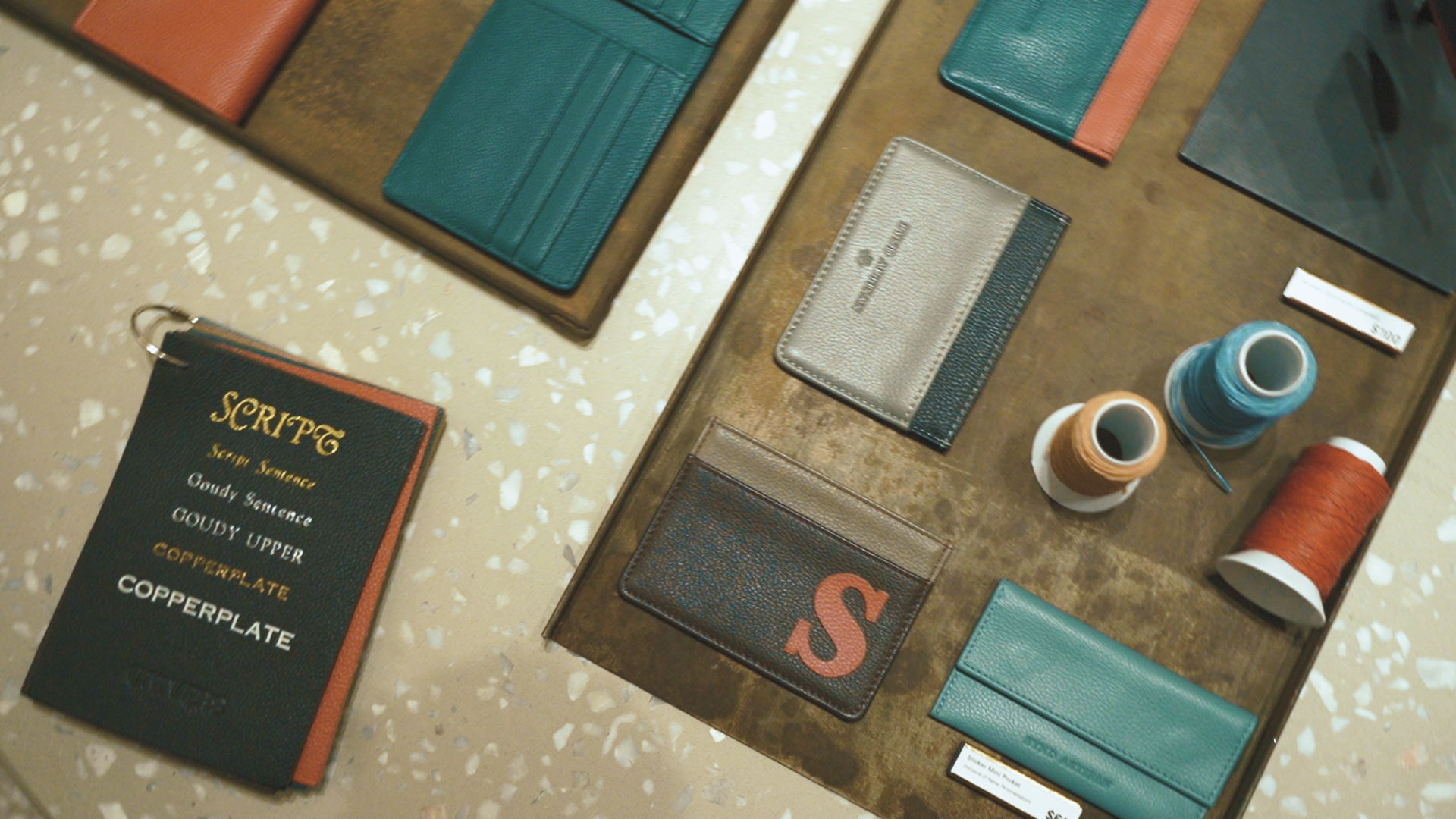 Some of the leather products offered by Bynd Artisan. Image via As'ad Nazif.
Some of the leather products offered by Bynd Artisan. Image via As'ad Nazif.
Like Bynd Artisan's notebooks, all of these leather products can be customised, allowing customers to add that personal touch to their purchase.
Quan shared that leather products made up about half of Bynd Artisan's business in its initial years, while today, the proportion is closer to 70-30 in favour of leather.
"We kind of knew right from the start how it would pan out. So we've always been great at embracing change, and then reacting to it," said Quan.
Customer feedback is vital
And how does Bynd Artisan keep pushing out new, innovative products?
"A lot of our products actually evolved because of our customer's feedback," said Quan.
For example, one popular item offered by Bynd Artisan is the Hygge Wine Bag, a trendy accessory for customers to bring their favourite bottle to a dinner gathering.
Quan admitted that it wasn't a very popular item when it was launched, although interest in the wine bag surged after Covid-19 reached Singapore's shores.
With increased rules for dining out, Quan theorised that more people are choosing to host dinner gatherings at home, making the wine bag an unexpected hit during the pandemic.
"Sometimes things change, and you just have to keep on trying to make it work," said Quan.
When one of Bynd Artisan's long-time customers suggested increasing the capacity of the wine bag, the pair took that feedback into consideration, and came up with the Hygge Double Wine Bag, which carries two wine bottles instead of one.
It was a simple innovation, but one that was born because of a customer's feedback, and Quan happily told me that the Double Wine Bag has been well received thus far.
Another popular item that has gone through several changes over the years is Bynd Artisan's leather book jacket.
According to Chan, many customers have given their own suggestions on how to improve the product, and many of these suggestions end up being incorporated in the latest edition.
The latest book jacket comes with two card slots, something that customers specifically requested for.
During my three hours in the store, I often saw both Chan and Quan interact with customers, even addressing some of them by name.
It is perhaps no surprise that they are receptive to feedback from their frequent customers, incorporating them into making better products.
Innovation born out of necessity
Given how the business revolves around customising paper and leather products, I expected both of them to have a wide array of personalised items with them at all times.
Quan surprised me by revealing that he does not really personalise his items, although he does own several Bynd Artisan products (just plain ones though).
"Maybe because my wife does it so much, I think it's better to balance things out a little," he joked.
Chan, on the other hand, did not disappoint, and eagerly retrieved her handbag to show me her collection of Bynd Artisan bling.
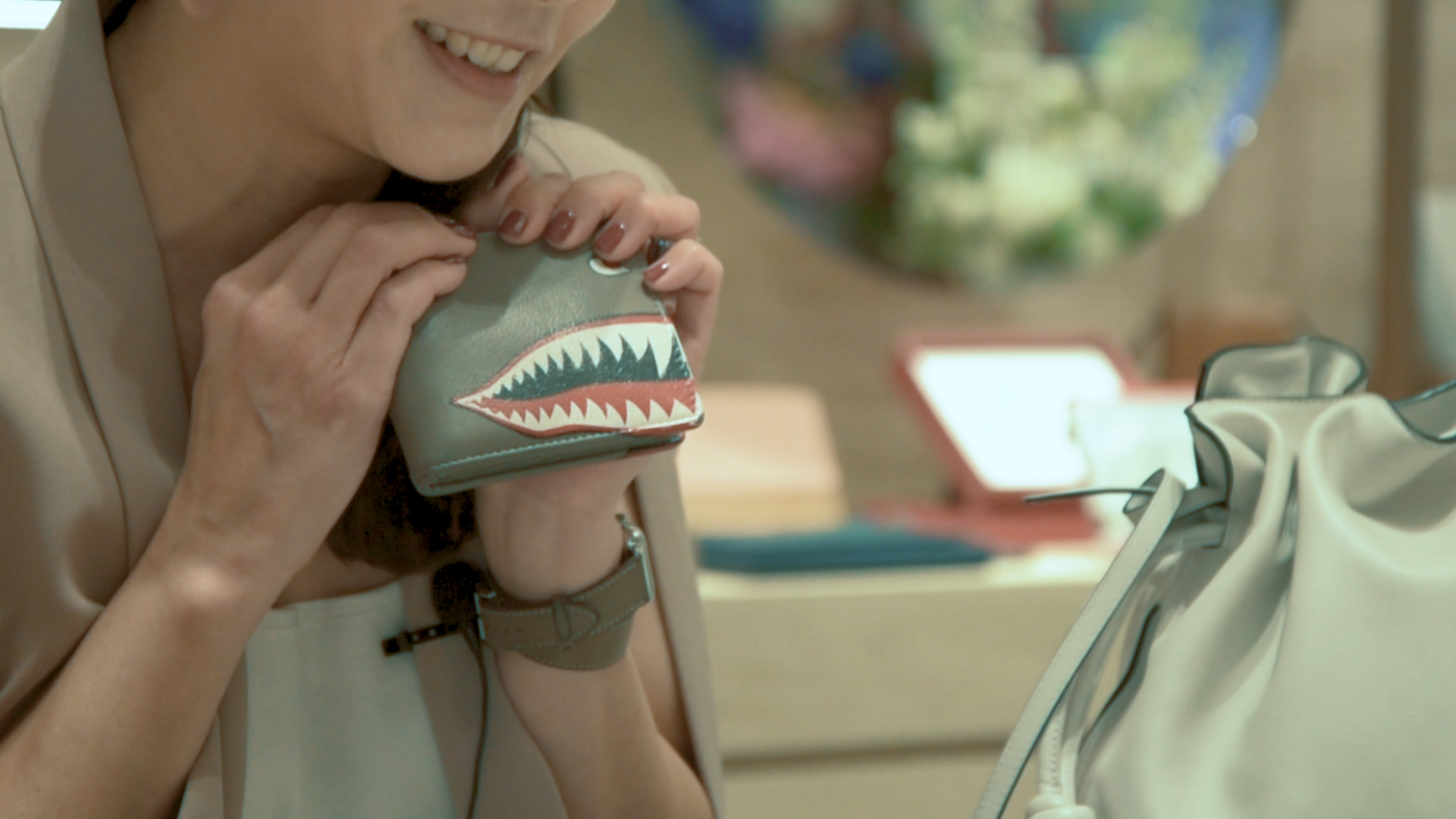 Chan's customised wallet. Image via As'ad Nazif.
Chan's customised wallet. Image via As'ad Nazif.
Indeed, she is a walking poster girl for her products. While items like a wallet and name card holder are perhaps not surprising, Chan also carries a leather hand sanitiser holder and token holder, both of which were introduced by Bynd Artisan during the Covid-19 pandemic.
"Obviously, I think our products are a reflection of what we want to use ourselves," she quipped.
When asked how Bynd Artisan keeps up with the times with these innovative offerings, Chan said that many of the company's new releases were simply born out of necessity: The duo sees a strong public demand for a certain item, and gets to work on creating their own version of it for sale.
"Sometimes, we are not great designers, we are simply responding to the situation," said Quan humbly.
The romance behind handmade products
While the pair has gone out of their way to modernise the paper industry, there are still some traditional aspects of the business that they are clinging on to.
For example, Bynd Artisan does not use machines to do engravings, preferring to rely on the skills of their seasoned artisans.
Chan said that handmade products have a different meaning, especially if you have a part to play in its creation, and told me that many people she knows swear by handmade notebooks.
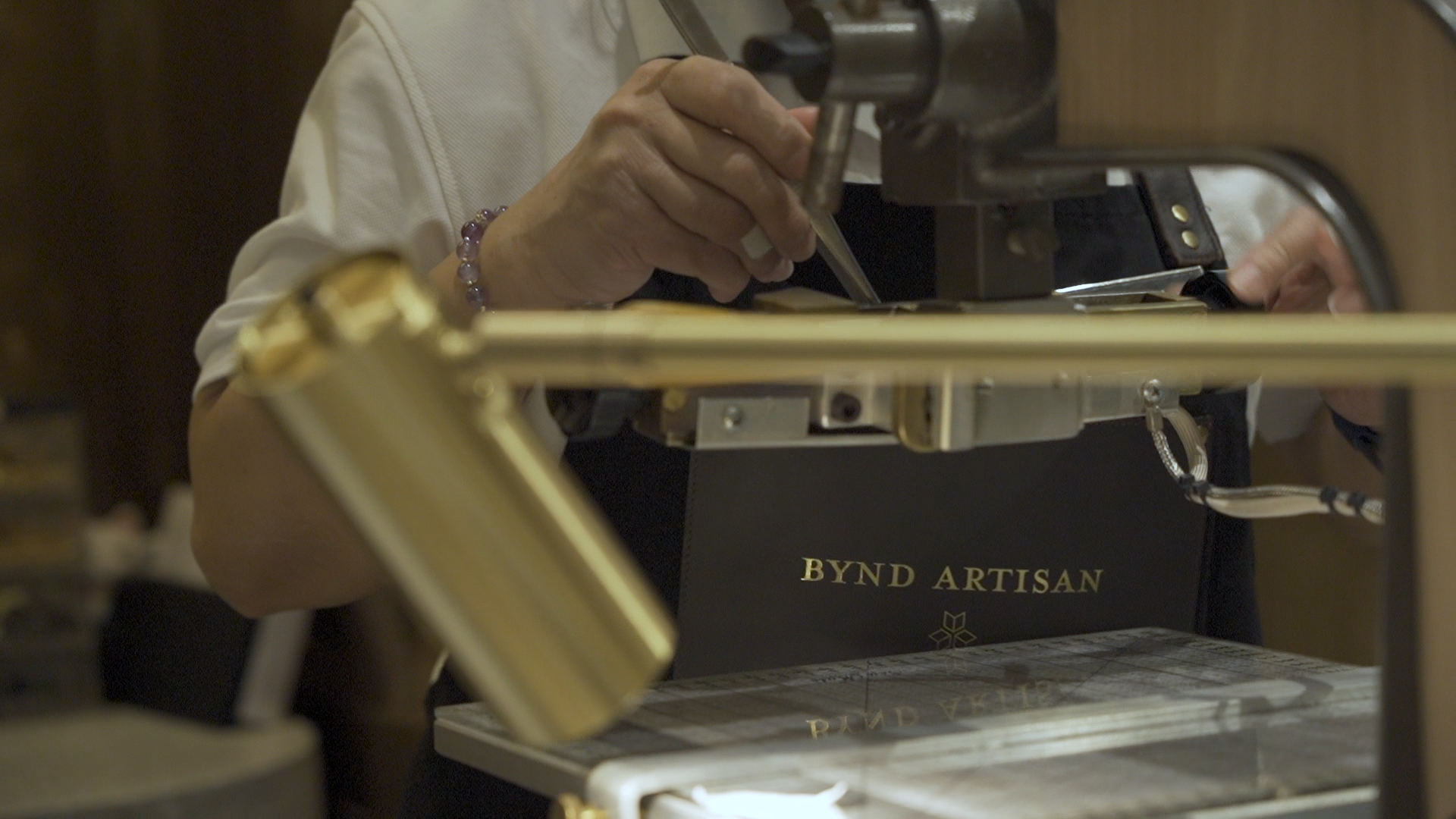 Image via As'ad Nazif.
Image via As'ad Nazif.
Although the duo admits that there are certain advantages to using machines, like greater speed or economies of scale, they remain firmly in support of offering handmade products to their customers.
When I asked them whether transitioning to machines could be a possibility in the future, Quan said that while such a move is "possible", he does not think that this is a route they want to go.
He said that using machines would remove the "romance" of the process, similar to how many people experience a similar feeling of romance towards putting a pen on paper.
Chan brought up the example of sushi chefs, who often spend decades honing their craft before being able to make sushi independently.
She said that in the not-too-distant future, it is likely that robots could take over many kitchen functions, although she would be reluctant to enter a sushi bar that has a robotic arm making her sushi.
"I think the experience will be very different," she said.
A no-blame culture is vital
Both Chan and Quan have immense respect for their craftsman, giving them due credit for the success of the business.
The core group of Bynd Artisan's craftsmen worked in Chan's family business, and boasted decades of experience with both paper and leather products before joining Chan's new venture.
Many of them are in their 60s; Bynd Artisan's master craftsman is 79-years-old this year.
However, having spent years working behind closed doors in a workshop setting, many of them were not prepared for the customer-facing role that they had to adopt when working at Bynd Artisan.
For customers who order personalised notebooks, one unique aspect of shopping at Bynd Artisan is that they can work with the craftsmen to select the different materials and designs for their books, before having the opportunity to see them put the notebook together at the store itself.
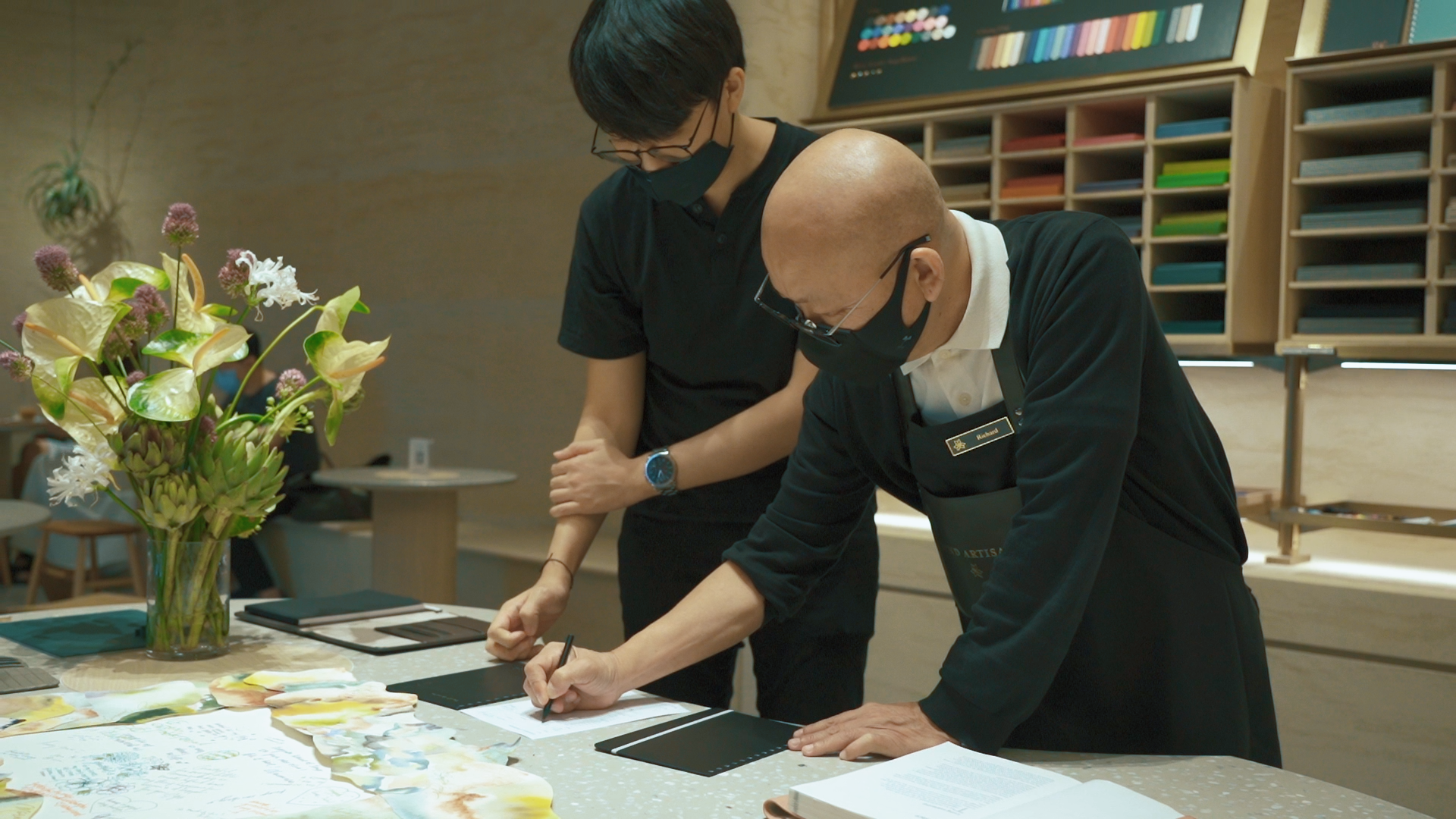 The artisans patiently go through the different customisation options for their customers. Image via As'ad Nazif.
The artisans patiently go through the different customisation options for their customers. Image via As'ad Nazif.
Facing customers was a daunting prospect, and one of the craftsman frankly confided with Chan that when Bynd Artisan first opened, he actually wished that there would be no customers, as he was very nervous at the prospect of handling them.
However, he adapted quickly to the new environment, and within a month, he could be seen complaining whenever there were no customers in sight.
Chan said that it was important for the pair to hold the hands of their craftsmen during the transition, and to do plenty of on-the-job training with them.
More importantly, Chan said that the company adopts a "no blame culture", explaining that mistakes are inevitable, but the most important thing is not repeating them.
She brought up an incident years ago, when one of her workers accidentally charged S$0.35 for a S$35 notebook, due to his inexperience with the credit card machine.
He even ran after the customer after realising his mistake, but was unable to find the customer in the end.
When Chan found out about this, she laughed it off, and told her staff not to worry about it.
"I think that a no-blame culture is very important to be able to give them the encouragement to keep on trying," said Chan.
Lessons on Leadership is a new Mothership series about the inspiring stories of Singapore’s business leaders and entrepreneurs, as well as the lessons and values we can learn from their lived experiences.
Follow and listen to our podcast here
If you like what you read, follow us on Facebook, Instagram, Twitter and Telegram to get the latest updates.
